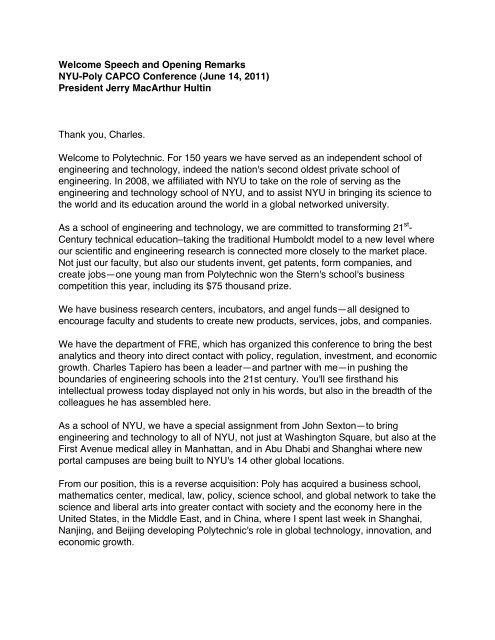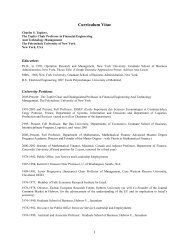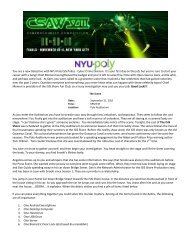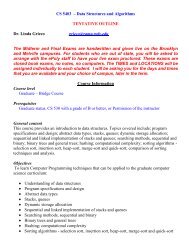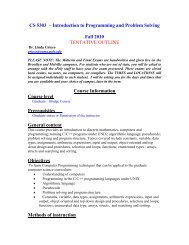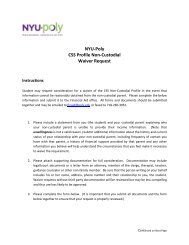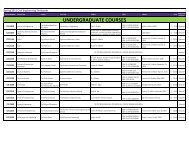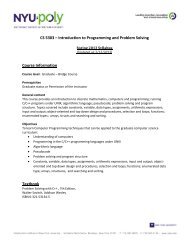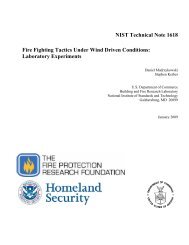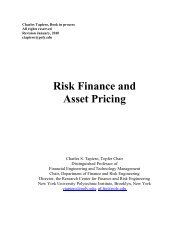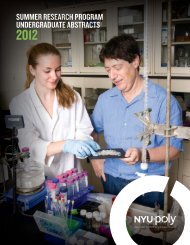Speech and Opening Remarks NYU-Poly CAPCO Conference
Speech and Opening Remarks NYU-Poly CAPCO Conference
Speech and Opening Remarks NYU-Poly CAPCO Conference
You also want an ePaper? Increase the reach of your titles
YUMPU automatically turns print PDFs into web optimized ePapers that Google loves.
Welcome <strong>Speech</strong> <strong>and</strong> <strong>Opening</strong> <strong>Remarks</strong><br />
<strong>NYU</strong>-<strong>Poly</strong> <strong>CAPCO</strong> <strong>Conference</strong> (June 14, 2011)<br />
President Jerry MacArthur Hultin<br />
Thank you, Charles.<br />
Welcome to <strong>Poly</strong>technic. For 150 years we have served as an independent school of<br />
engineering <strong>and</strong> technology, indeed the nation's second oldest private school of<br />
engineering. In 2008, we affiliated with <strong>NYU</strong> to take on the role of serving as the<br />
engineering <strong>and</strong> technology school of <strong>NYU</strong>, <strong>and</strong> to assist <strong>NYU</strong> in bringing its science to<br />
the world <strong>and</strong> its education around the world in a global networked university.<br />
As a school of engineering <strong>and</strong> technology, we are committed to transforming 21 st -<br />
Century technical education–taking the traditional Humboldt model to a new level where<br />
our scientific <strong>and</strong> engineering research is connected more closely to the market place.<br />
Not just our faculty, but also our students invent, get patents, form companies, <strong>and</strong><br />
create jobs—one young man from <strong>Poly</strong>technic won the Stern's school's business<br />
competition this year, including its $75 thous<strong>and</strong> prize.<br />
We have business research centers, incubators, <strong>and</strong> angel funds—all designed to<br />
encourage faculty <strong>and</strong> students to create new products, services, jobs, <strong>and</strong> companies.<br />
We have the department of FRE, which has organized this conference to bring the best<br />
analytics <strong>and</strong> theory into direct contact with policy, regulation, investment, <strong>and</strong> economic<br />
growth. Charles Tapiero has been a leader—<strong>and</strong> partner with me—in pushing the<br />
boundaries of engineering schools into the 21st century. You'll see firsth<strong>and</strong> his<br />
intellectual prowess today displayed not only in his words, but also in the breadth of the<br />
colleagues he has assembled here.<br />
As a school of <strong>NYU</strong>, we have a special assignment from John Sexton—to bring<br />
engineering <strong>and</strong> technology to all of <strong>NYU</strong>, not just at Washington Square, but also at the<br />
First Avenue medical alley in Manhattan, <strong>and</strong> in Abu Dhabi <strong>and</strong> Shanghai where new<br />
portal campuses are being built to <strong>NYU</strong>'s 14 other global locations.<br />
From our position, this is a reverse acquisition: <strong>Poly</strong> has acquired a business school,<br />
mathematics center, medical, law, policy, science school, <strong>and</strong> global network to take the<br />
science <strong>and</strong> liberal arts into greater contact with society <strong>and</strong> the economy here in the<br />
United States, in the Middle East, <strong>and</strong> in China, where I spent last week in Shanghai,<br />
Nanjing, <strong>and</strong> Beijing developing <strong>Poly</strong>technic's role in global technology, innovation, <strong>and</strong><br />
economic growth.
In just one example, we are bringing engineering to the medical school in this way: a<br />
professor with knowledge of epilepsy is partnering with one of our leaders in ECE, <strong>and</strong><br />
together they are developing a chip that detects <strong>and</strong> counter-attacks incipient epileptic<br />
seizures.<br />
As a second example, <strong>Poly</strong>technic is at the heart of <strong>NYU</strong>'s proposal to Mayor<br />
Bloomberg to create a new campus of applied science <strong>and</strong> technology. We have offered<br />
to the Mayor to create a multi-university campus that focuses on the future of cities,<br />
forming a Center for Urban Sustainability <strong>and</strong> Progress.<br />
I could give many more examples, but time is short, so look at our web site for more on<br />
how <strong>Poly</strong>technic <strong>and</strong> <strong>NYU</strong> are merging into a singular science <strong>and</strong> engineering<br />
powerhouse.<br />
Third, I want to complement you on taking on the issues, problems, <strong>and</strong> opportunities<br />
represented by today's agenda. I cut my teeth on financial collapse in the savings <strong>and</strong><br />
loan crisis of 1985, not the one you are thinking of that drew the United States economy<br />
to its nose, but the one in Ohio that was a preview of the national collapse that followed.<br />
I led the state-chartered corporation that provided working capital to rescue that small<br />
set of Ohio S&Ls too strong to be shut-down <strong>and</strong> too weak to survive on their own. With<br />
me was this afternoon's panel chair, Rogdin Cohen, brought from NYC to help us<br />
structure our solutions.<br />
For Rogdin, Ohio was "summer camp" for the big S&L crisis that appeared on the<br />
national scene about three years later. And for me, it was the basis of getting President<br />
Clinton to appointment me to Freddie Mac's Board.<br />
Of course, Ohio's crisis was a case of, not too large to fail, but too small to care. We<br />
learned in the late 80s <strong>and</strong> again in 2008, what too big to fail really means. I suspect<br />
you will have an exciting team debating issues <strong>and</strong> designing solutions that provide us<br />
with a post-2008, global financial model for managing risk <strong>and</strong> financial activity.<br />
Finally, let me challenge you in the months ahead to help me deal with the "Faustian<br />
bargain" that the world has made with technology. Simply put, here's my concern: in the<br />
coming years, we will see technology capable of producing food, products, education,<br />
<strong>and</strong> services using about 1 billion people, <strong>and</strong> leaving about 8 billion people without the<br />
two things they need: jobs <strong>and</strong> income.<br />
Assuming 1 billion find work doing those things the rest of us don't want to do—what do<br />
the 7 billion others do. Technology <strong>and</strong> the global economy have already hollowed out<br />
the American economy; my concern is that in the next years, technology will hollow out<br />
the global economy <strong>and</strong> leave us with 7 billion people who are idled by technology <strong>and</strong><br />
lack the incomes that stoke the financial engines that you so dearly care about.
This, of course, is a bigger assignment than today's agenda, but it is one that I am more<br />
<strong>and</strong> more convinced we must deal with.<br />
With that, I'd like to join you all day to discuss <strong>and</strong> debate the issues on this fabulous<br />
agenda with the brilliant speakers <strong>and</strong> panelists that Charles Tapiero <strong>and</strong> the FRE<br />
faculty have assembled, but as the CEO of <strong>Poly</strong>technic, I have do what CEOs do as<br />
infrequently as possible, humbly report to the Board of Trustees. Enjoy the day.


